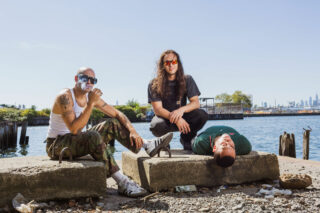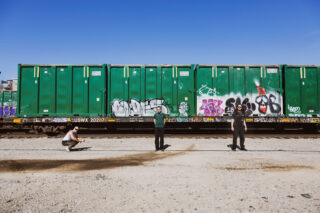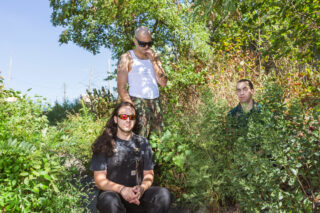Show Me The Body: “Build something of your own, with your friends, in your community”
The NYC experimental hardcore group on their ferocious new album, expanding their sound and the state of the scene in their ever-changing city

The NYC experimental hardcore group on their ferocious new album, expanding their sound and the state of the scene in their ever-changing city
“In what way was Dog Whistle critically acclaimed?” anti-frontman Julian Cashwan Pratt riddles me over the other end of a Zoom call when I start to discuss the success of Show Me The Body’s previous album, released in 2019. Julian is joined by his fellow bandmates Harlan Steed and Jackie Jackieboy – Harlan and Julian are at their respective locations in New York, and Jackie is calling in from Massachusetts.
When I reel off the unanimous praise the experimental hardcore outfit’s second full album received (have a Google and you’ll see Dog Whistle’s 80 Metacritic score) Julian quickly apologises, with the disposition of a mischievous teenager whose only intention is to cause havoc; more chaotic neutral than chaotic good. I’m slightly more at ease, but this is a man who has a reputation for being visceral and incautious, especially in his live performances. His latest reported antic was just this August, where he pushed a fan that climbed on stage into a stacked speaker set, causing it to fall over. The band posted the footage on their Instagram with the caption “NO DISRESPECT”.
Harlan quickly chimes in to ease tension, and continues to discuss how things have changed for Show Me The Body since their last record. “We were kind of forced to reconstruct our general schedule and structure for operating as a band. Everyone had to shut down, and we ended up building a recording studio [for] the last three years.”
The recording studio in question is part of the band’s CORPUS community, which is their network of like-minded artists and creative collaborators. The collective started as a means to facilitate a need within Show Me The Body’s community caused by the pandemic. Julian explains: “Rather than spending all the time in this studio, there’s no shows happening, [so] how do we do something that our community can benefit from on a convenient basis?”
This thinking branched off to create a mutual aid fund for New York artists; as live music dissipated and the wider industry was objectively unable to generate income, Show Me The Body knew they had to do something about it. “Like Young Lords [the civil and human rights organisation],” says Julian “ – they wanted to bring the community together and demand sovereignty in Puerto Rico, but the people said ‘Yo, we just need the trash picked up’. So it was all on a needs-based level. While doing that, not being on the road really gave us time to really hone in on building our own studio and a space where other other kids could come and benefit. The studio residency was really important to us, to build a place that we could feel comfortable in.”
The CORPUS studio was where Harlan and Julian created Show Me The Body’s latest album, Trouble The Water, alongside their new drummer Jackie who they met through several tours with Jackie’s other band Urochromes (previous drummer Noah Cohen-Corbett left at the start of the pandemic). Harlan says Jackie’s been “killing it” ever since.
“It’s about creating a non-physical thing out of a physical thing. Like a ceremony,” Julian says, going on to speak about the choice of album title. “When Harlan plugs in, Jackie gets his shit set up, and when I get my shit together, hopefully these are physical things that become tools for spell-making. There’s a real metaphysical reaction that happens in the room. We’re all Jewish and trouble the water is when Moses troubled the River Nile, he united the tribes of Judaica and united everybody. He created a spell. It’s also about creating family, creating ceremonies. It’s alchemy… how do we circumvent our general and current reality and make something more beautiful, more than we could imagine before? It reflects all of Show Me The Body’s lyrics – to make upset, to irritate.”

Trouble The Water is the band’s most dynamic material in their decade-long career. While still hardcore to the bone, the production scale has been amplified and the addition of capricious synths throughout mirror the mystifying quality that is encompassed in everything the band does.
The album was written almost straight after Dog Whistle came out. “Julian and I were interested in keeping up the momentum of our writing after we made the second album,” says Harlan. “A few of the songs on the record came right off of Dog Whistle, and then naturally, the rest of them were formed during the subsequent years.
“We really re-examined our writing process with this record. Predominantly it was Julian and I writing together, because we were locked down and in the studio that we built, and then we got Jackie to join to help us record and finish writing it, which was really integral and wrapped it all together. The goal [with] pretty much every record we make is to push ourselves further and to become more like ourselves than we have ever been before on a record. We’re not really interested in participating in existing genres; more so we want to build our own sound and our own universe as a band. I think this record is probably the one that has gotten closest to doing it.”
The new album opens with the foreboding ‘Loose Talk’, led by the eerie and metallic clanging of Julian’s banjo. It’s one of the only songs he’s written in a stream-of-consciousness style. “I wrote the main riff just sitting in a room alone for many hours. It is literally an introduction to the record in that there is a call at the end that happens a couple times, which is the calling card for the rest of the album. Not only for us in general to lead with love and understanding and grace, but also to keep it serious as well. It’s love and respect, but come and fuck with us and see what might happen…”
Across the record the band push further into the realms of experimentation and ambition, too. Take the drone punk of ‘Radiator’, where synthesisers take up most of the space, a product of Harlan exploring electronic music more deeply in the pandemic. “We were really fortunate to have Will Calhoun from Living Colour on that song, playing timbales for the latter half,” he says, “and he’s the only featured artist on the record. I think the goal with that song was to create a paradigm shift in the contrast against a lot of the more full live band-sounding songs.”
“When we talk about genre, genreless, or whatever the fuck you want to say, a lot of our focus comes from keeping it in the vein of New York sound,” says Julian. “In New York feeling and that true spirit of the city in that lineage. [In] part of that song, there’s literal lyrics ripped from one of my favourite groups, which is The Persuasions, from their song ‘Don’t It Make You Want To Go Home’ [originally by Joe South]: ‘All God’s children get weary while they roam, don’t make you want to go home’. We also rip the title for the song ‘We Came to Play’ off the album by The Persuasions. So these are just part of the nods that we give to not just this city, but the New York sound and New York feeling.”
Harlan tells me that Trouble The Water was really a moment for Show Me The Body to approach making an album with “a lot more certainty and intentionality”, like on ‘Buck 50’, a looser prog rock moment on the record.
“There were a lot of ideas going around,” he says. “We were trying to make something that was more psychedelic, that referenced a lot of our influences growing up. It was also a song that when we wrote it, I don’t know if we even ever played it all together. We kind of just kept forming it. Julian brought the main demo to the table originally but we kept pushing it and pushing it in the production stages to get it where it’s at. I think it’s one of the cooler songs on the record for sure.”
“There’s a wonderful quote from the choreographer for Batsheva Dance Company, which is a Israeli dance company,” says Julian. “Something that he says is that someone may have a wonderful idea but if you can already see it in your head, it’s probably not so amazing. What is even more amazing is if you can find something together that no one person could see on their own. So hopefully, Show Me The Body songs are an amalgamation of what Harlan might see in a dream, what I might see in a dream, or Jackie might see in a dream. These are all three visions coming together to create a reality that is previously unseen by one human at all.”
“We’ve made it an incumbent upon ourselves to breach [our] roles with this record.” says Harlan. “Julian really grew into more of an engineer and sound designer, and [‘Buck 50’] was largely programmed and written by him in the electronic department, which was really cool. In the past when songs were coming together, Julian [would say] ‘The songs aren’t weird enough, they’re not experimental enough, you need to go make some crazy shit for these songs!’ What was great was he threw down in that department this time around. I think we all stepped out of our comfort zones and threw down in each other’s roles in some form or another.”

As their cult-like status solidifies and wider popularity increases three albums in, a need for variability is ever more palpable within Show Me The Body, as well as beyond themselves and their microcosm of a shapeshifting New York. You get the sense that Julian could wax lyrical about it for hours, justifiably: this state and this city has been fundamental to the band’s entire existence.
“This city is always changing, always morphing, always becoming something new,” he says. “Part of how we feel about it is always trying to make something new, always trying to make something we have not seen before. That is both a nod to the lineage that we come from and that we exist within, as well as out of reverence to these originators. We want to add to that lineage and add to the conversation, into the vocabulary of what New York sound could be, what rock and roll music can be, of what hardcore music can be. We wish to add to this vernacular, to create new words, new sentences, that other children can then speak and create music with.
“When we started out, the response from a lot of people was, ‘Oh that’s pretty weird, we want no part of that weird shit!’ I think nowadays the conversation has very much flipped around, everybody wants a piece!” He stops. “But real talk: we had to create our own scene to exist in, and now that scene is very, very big, and there’re bands that have been born out of these things. There’re new performers that exist within it that are younger than us and I think it’s a lovely thing. The New York hardcore and punk scene is so much more multifaceted now. A lot of people in other places are used to a hardcore beat down show… I think that’s almost more of an uncommon thing in the city these days, which I’m very happy about.
“How we exist within our city, and our community, is not something extraordinary and very special. Anybody can do this, and anybody can move like this and think about music. This is not something that is groundbreaking. It’s a call to fuck with CORPUS, but also to build something of your own, with your friends, in your community.”